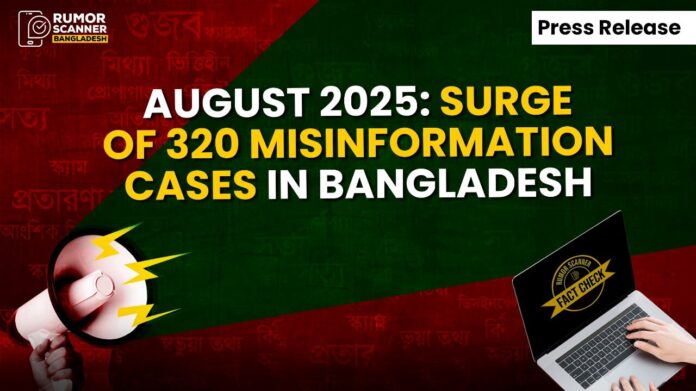Based on an analysis of fact-checks published on its website in August, Rumor Scanner, a fact-checking organization in Bangladesh, has identified 320 instances of misinformation that circulated online. The data indicates that the most prevalent category of misinformation pertained to political subjects, accounting for 202 instances, or approximately 63% of the total.
The remaining cases of misinformation were distributed across various other topics, including 63 on national issues, 15 on international affairs, 14 on entertainment and literature, 11 on religious matters, 9 on education, 3 on fraudulent activities, 2 on sports, and 1 on science and technology.
In these instances, the primary medium for misinformation was video, which constituted 218 cases. This was followed by text-based misinformation with 64 cases, and image-based with 38 cases. Of the total identified misinformation, 219 instances were classified as false, 25 as doctored, 75 as misleading, and 1 as sarcasm.
In August, Facebook served as the primary platform for the spread of misinformation, with 271 instances recorded. Other platforms also played a significant role: Instagram (147), TikTok (86), YouTube (54), X (27), and Threads (at least 3). Notably, local media outlets were not exempt, as Rumor Scanner observed 22 instances of misinformation being broadcast by a considerable number of them.
For several months, the spread of communal disinformation targeting Bangladesh has been a significant concern. Rumor Scanner identified 11 such cases in August alone. Of these, six were traced to social media accounts and pages with a Bangladeshi identity.
During August, Rumor Scanner’s team observed five pieces of misinformation specifically targeting the current interim government. To understand their nature, these were categorized into two types: positive misinformation that supports the government and negative misinformation that works against it. The findings show that all five of these false claims portrayed the government in a negative light.
The interim government’s Chief Adviser, Dr. Muhammad Yunus, was the subject of 10 instances of misinformation in August, all of which presented him in a negative way. Additionally, misinformation was identified concerning other advisers: Jahangir Alam Chowdhury and Dr. Asif Nazrul were each targeted by two negative claims, while Asif Mahmud Sajib Bhuiyan was the subject of one, also negative.
Widespread discussions are underway regarding the thirteenth national parliamentary election. Disinformation surrounding this election has increased over the past few months. Eight such instances of disinformation were identified in August.
Based on an analysis of its August fact-checks, Rumor Scanner found that the Bangladesh Nationalist Party (BNP), its affiliated organizations, and its leaders were targeted by the highest number of disinformation instances (45) among active political parties. Specifically, 23 pieces of disinformation were circulated concerning the party itself, with approximately 91% of these having the potential to create a negative impression. During this time, two instances of disinformation were spread about the party’s acting chairman, Tarique Rahman, with half of them being negative. Furthermore, five instances of disinformation were circulated about the student wing, Chhatra Dal (80% of which were negative), and two instances about the youth wing, Jubo Dal (both of which were negative).
After the BNP, Bangladesh Jamaat-e-Islami, along with its affiliated organizations and leaders, was the subject of the second-highest amount of disinformation, with 25 instances. Thirteen of these instances were directly related to the party itself, and all of them were found to have the potential to create a negative impression. Additionally, nine instances of disinformation were circulated about its student wing, Bangladesh Islami Chhatra Shibir, all of which were negative.
Additionally, Rumor Scanner identified 16 instances of disinformation related to the National Citizen Party (NCP) and its members in August. Of these, 10 instances were circulated concerning the party itself, and all of them were found to have the potential to create a negative impression.
In August, 92 instances of disinformation were circulated concerning the now-banned Bangladesh Awami League, its affiliated organizations, and its members. Of these, 32 were directly related to the party itself, with approximately 97% of the instances having the potential to create a positive impression. Evidence was also found of 23 instances of disinformation being spread about the party’s president, Sheikh Hasina, with around 96% of them being positive. Additionally, 13 instances of disinformation were identified concerning the party’s banned student wing, Bangladesh Chhatra League (85% of which were positive), and 9 instances regarding Jubo League (89% of which were positive).
State forces are not immune to the proliferation of misinformation. In August, Rumor Scanner observed 21 instances of misinformation concerning the Bangladesh Army, including eight that targeted its Chief of Army Staff, General Waker-uz-Zaman. Additionally, the organization identified 23 instances of misinformation related to the Bangladesh Police, which included one case targeting its Inspector General, Baharul Alam.
An analysis of the misinformation identified in August reveals that Rumor Scanner detected 38 instances of fake content created with artificial intelligence (AI). Additionally, three instances of deepfake content were identified during the same period.
In August, six key events or issues in Bangladesh were observed to be sources of multiple pieces of misinformation. These include the murder of journalist Asaduzzaman Tuhin in Gazipur on August 7, the death anniversary of Bangladesh’s first President Sheikh Mujibur Rahman on August 15, the upcoming Dhaka University Central Students’ Union (DUCSU) election, the stone looting incident in Sylhet, the visit of Pakistan’s Deputy Prime Minister and Foreign Minister Muhammad Ishaq Dar to Bangladesh, and the clash between Jatiya Party (JAPA) and Gono Odhikar Parishad in Dhaka on August 29.
Among these, the death anniversary of Sheikh Mujibur Rahman was associated with the highest number of misinformation instances (21). Additionally, eight instances were identified related to the DUCSU election, six surrounding the Pakistani Foreign Minister’s visit to Dhaka, and four for each of the other three issues.
The use of media names, logos, headlines, and fake photocards to spread misinformation appears to be decreasing. In August, 19 instances of misinformation were circulated using these methods, involving 12 news outlets within the country.
Issued by
Tanvir Mahatab Abir
Senior Fact Checker,
Rumor Scanner Bangladesh
[email protected]






